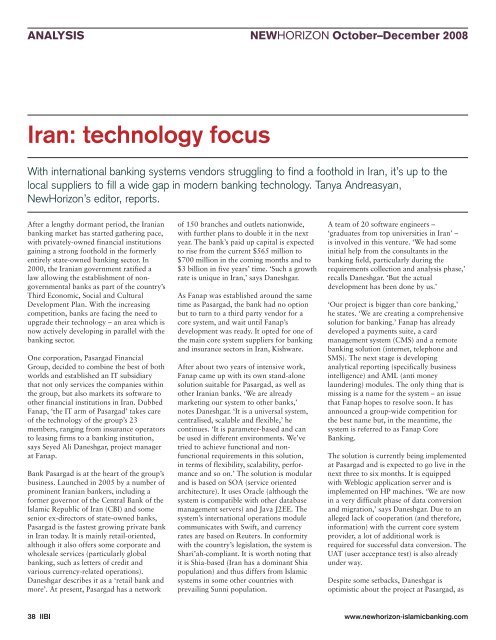azerbaijan: emerging market islamic banking and finance
azerbaijan: emerging market islamic banking and finance
azerbaijan: emerging market islamic banking and finance
Create successful ePaper yourself
Turn your PDF publications into a flip-book with our unique Google optimized e-Paper software.
ANALYSIS<br />
NEWHORIZON October–December 2008<br />
Iran: technology focus<br />
With international <strong>banking</strong> systems vendors struggling to find a foothold in Iran, it’s up to the<br />
local suppliers to fill a wide gap in modern <strong>banking</strong> technology. Tanya Andreasyan,<br />
NewHorizon’s editor, reports.<br />
After a lengthy dormant period, the Iranian<br />
<strong>banking</strong> <strong>market</strong> has started gathering pace,<br />
with privately-owned financial institutions<br />
gaining a strong foothold in the formerly<br />
entirely state-owned <strong>banking</strong> sector. In<br />
2000, the Iranian government ratified a<br />
law allowing the establishment of nongovernmental<br />
banks as part of the country’s<br />
Third Economic, Social <strong>and</strong> Cultural<br />
Development Plan. With the increasing<br />
competition, banks are facing the need to<br />
upgrade their technology – an area which is<br />
now actively developing in parallel with the<br />
<strong>banking</strong> sector.<br />
One corporation, Pasargad Financial<br />
Group, decided to combine the best of both<br />
worlds <strong>and</strong> established an IT subsidiary<br />
that not only services the companies within<br />
the group, but also <strong>market</strong>s its software to<br />
other financial institutions in Iran. Dubbed<br />
Fanap, ‘the IT arm of Pasargad’ takes care<br />
of the technology of the group’s 23<br />
members, ranging from insurance operators<br />
to leasing firms to a <strong>banking</strong> institution,<br />
says Seyed Ali Daneshgar, project manager<br />
at Fanap.<br />
Bank Pasargad is at the heart of the group’s<br />
business. Launched in 2005 by a number of<br />
prominent Iranian bankers, including a<br />
former governor of the Central Bank of the<br />
Islamic Republic of Iran (CBI) <strong>and</strong> some<br />
senior ex-directors of state-owned banks,<br />
Pasargad is the fastest growing private bank<br />
in Iran today. It is mainly retail-oriented,<br />
although it also offers some corporate <strong>and</strong><br />
wholesale services (particularly global<br />
<strong>banking</strong>, such as letters of credit <strong>and</strong><br />
various currency-related operations).<br />
Daneshgar describes it as a ‘retail bank <strong>and</strong><br />
more’. At present, Pasargad has a network<br />
of 150 branches <strong>and</strong> outlets nationwide,<br />
with further plans to double it in the next<br />
year. The bank’s paid up capital is expected<br />
to rise from the current $565 million to<br />
$700 million in the coming months <strong>and</strong> to<br />
$3 billion in five years’ time. ‘Such a growth<br />
rate is unique in Iran,’ says Daneshgar.<br />
As Fanap was established around the same<br />
time as Pasargad, the bank had no option<br />
but to turn to a third party vendor for a<br />
core system, <strong>and</strong> wait until Fanap’s<br />
development was ready. It opted for one of<br />
the main core system suppliers for <strong>banking</strong><br />
<strong>and</strong> insurance sectors in Iran, Kishware.<br />
After about two years of intensive work,<br />
Fanap came up with its own st<strong>and</strong>-alone<br />
solution suitable for Pasargad, as well as<br />
other Iranian banks. ‘We are already<br />
<strong>market</strong>ing our system to other banks,’<br />
notes Daneshgar. ‘It is a universal system,<br />
centralised, scalable <strong>and</strong> flexible,’ he<br />
continues. ‘It is parameter-based <strong>and</strong> can<br />
be used in different environments. We’ve<br />
tried to achieve functional <strong>and</strong> nonfunctional<br />
requirements in this solution,<br />
in terms of flexibility, scalability, performance<br />
<strong>and</strong> so on.’ The solution is modular<br />
<strong>and</strong> is based on SOA (service oriented<br />
architecture). It uses Oracle (although the<br />
system is compatible with other database<br />
management servers) <strong>and</strong> Java J2EE. The<br />
system’s international operations module<br />
communicates with Swift, <strong>and</strong> currency<br />
rates are based on Reuters. In conformity<br />
with the country’s legislation, the system is<br />
Shari’ah-compliant. It is worth noting that<br />
it is Shia-based (Iran has a dominant Shia<br />
population) <strong>and</strong> thus differs from Islamic<br />
systems in some other countries with<br />
prevailing Sunni population.<br />
A team of 20 software engineers –<br />
‘graduates from top universities in Iran’ –<br />
is involved in this venture. ‘We had some<br />
initial help from the consultants in the<br />
<strong>banking</strong> field, particularly during the<br />
requirements collection <strong>and</strong> analysis phase,’<br />
recalls Daneshgar. ‘But the actual<br />
development has been done by us.’<br />
‘Our project is bigger than core <strong>banking</strong>,’<br />
he states. ‘We are creating a comprehensive<br />
solution for <strong>banking</strong>.’ Fanap has already<br />
developed a payments suite, a card<br />
management system (CMS) <strong>and</strong> a remote<br />
<strong>banking</strong> solution (internet, telephone <strong>and</strong><br />
SMS). The next stage is developing<br />
analytical reporting (specifically business<br />
intelligence) <strong>and</strong> AML (anti money<br />
laundering) modules. The only thing that is<br />
missing is a name for the system – an issue<br />
that Fanap hopes to resolve soon. It has<br />
announced a group-wide competition for<br />
the best name but, in the meantime, the<br />
system is referred to as Fanap Core<br />
Banking.<br />
The solution is currently being implemented<br />
at Pasargad <strong>and</strong> is expected to go live in the<br />
next three to six months. It is equipped<br />
with Weblogic application server <strong>and</strong> is<br />
implemented on HP machines. ‘We are now<br />
in a very difficult phase of data conversion<br />
<strong>and</strong> migration,’ says Daneshgar. Due to an<br />
alleged lack of cooperation (<strong>and</strong> therefore,<br />
information) with the current core system<br />
provider, a lot of additional work is<br />
required for successful data conversion. The<br />
UAT (user acceptance test) is also already<br />
under way.<br />
Despite some setbacks, Daneshgar is<br />
optimistic about the project at Pasargad, as<br />
38 IIBI www.newhorizon-<strong>islamic</strong><strong>banking</strong>.com
















